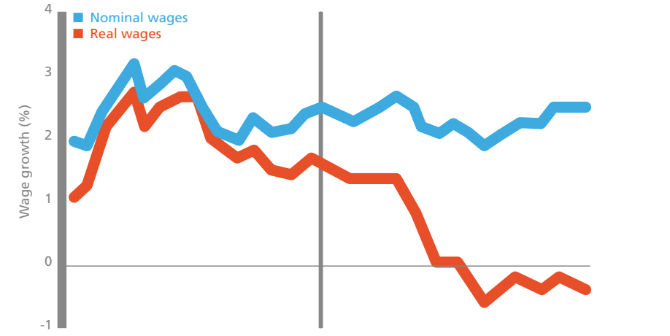 Since World War II the global economy has become increasingly integrated. Brexit runs counter to this trend and has ignited a debate about the future of the EU and the global economy. In a recent paper, Thomas Sampson (LSE Centre for Economic Performance) discusses why the UK voted to leave and what this tells us about the future of globalisation. He argues that understanding the motivations of Leave voters will play an important role in determining the future of globalisation.
Since World War II the global economy has become increasingly integrated. Brexit runs counter to this trend and has ignited a debate about the future of the EU and the global economy. In a recent paper, Thomas Sampson (LSE Centre for Economic Performance) discusses why the UK voted to leave and what this tells us about the future of globalisation. He argues that understanding the motivations of Leave voters will play an important role in determining the future of globalisation.
Brexit may prove to be a minor diversion on the path to greater integration, a sign that globalisation has reached its limits, or the start of a new era of protectionism. Which of these eventualities is realised will depend, in part, upon whether leave voters supported Brexit to reclaim sovereignty from the EU or as a protest against their economic and social struggles. We do not yet know the relative importance of these two motivations.
Who voted for Brexit?
The referendum split the electorate on the basis of geography, age, education and ethnicity. Figure 1 shows data on voting patterns. Older and less educated voters were more likely to vote leave, while large majorities of black and Asian voters supported remain. Voting to leave the EU was also strongly associated with holding socially conservative political beliefs and thinking life in Britain is getting worse rather than better.
Statistical analysis of voting patterns has established three main regularities. First, education and, to a lesser extent, age are the strongest demographic predictors of voting behaviour. Second, poor economic outcomes at the individual or area level are associated with voting to leave, but economic variables account for less of the variation in the leave vote share than educational differences.
support for leaving the EU is strongly associated with self-reported opposition to immigration
Third, support for leaving the EU is strongly associated with self-reported opposition to immigration, but a higher share of EU immigrants in the local population is actually associated with a reduction in the leave vote share. There is some evidence growth in immigration is associated with a higher leave vote share, but the effect is small and not always present.
Overall, the picture painted by the voting data is that the Brexit campaign succeeded because it received the support of a coalition of voters who felt left behind by modern Britain. People may have felt left-behind because of their education, age, economic situation or because of tensions between their values and the direction of social change, but, broadly speaking, a feeling of social and economic exclusion appears to have translated into support for Brexit.

Figure 1: Leave Vote Shares in Brexit Referendum. Source: Regional data from the Electoral Commission. Demographic data from Lord Ashcroft Polls.
Why did the UK vote for Brexit?
Knowing that left-behind voters supported Brexit does not tell us why they voted for Brexit. One possible explanation can be ruled out immediately. The Brexit vote was not the result of a rational assessment of the economic costs and benefits of Brexit. There is a consensus among economists that EU membership benefits the UK economy on aggregate and there is no evidence changes in either trade or immigration due to EU membership have had large enough distributional consequences to offset the aggregate benefits and leave left-behind voters worse off. This leaves two plausible hypotheses for why the UK voted to leave.
the Brexit vote was not the result of a rational assessment of the economic costs and benefits of Brexit
Hypothesis 1: Primacy of the Nation State. Successful democratic government requires the consent and participation of the governed. British people identify as citizens of the UK not the EU. Consequently, they feel the UK should be governed as a sovereign nation-state. According to this hypothesis, the UK voted to leave because Brexit supporters wanted to take back control of their borders and their country.
Hypothesis 2: Scapegoating of the EU. Many people feel left behind by modern Britain. Influenced by the anti-EU sentiments expressed by Britain’s newspapers and eurosceptic politicians, these individuals have come to blame immigration and the EU for many of their woes. According to this hypothesis, voters supported Brexit because they believe EU membership has contributed to their discontent with the status quo.
 CC0 Public Domain.
CC0 Public Domain.
It is likely that both hypotheses played some role in the referendum outcome, but the existing evidence is insufficient to assess their relative contributions. When leave voters are asked to explain their vote, national sovereignty and immigration are the most frequently cited reasons, but these responses are consistent with either hypothesis. They could reflect voters’ attachment to the UK as a nation state, or they may mirror the language used by pro-Brexit newspapers and politicians. However, the hypotheses have quite different implications for how policymakers should respond to Brexit and for the future of European and global integration.
Brexit and the future of international integration
The nation-state hypothesis is closely related to Dani Rodrik’s idea that nation-states, democratic politics and deep international economic integration are mutually incompatible. From this perspective, the deep integration promoted by the EU, in particular, free movement of labour and regulatory harmonisation, cannot coexist with national democracy.
For Europe to remain democratic, either the people of Europe must develop a collective identity or the supranational powers of the EU must be reduced. However, the nation-state hypothesis does not directly threaten the sustainability of shallow integration agreements that aim to lower tariffs and border non-tariff barriers. The UK government’s “global Britain” approach to Brexit is based on the nation-state hypothesis.
The scapegoating hypothesis does not threaten the ideal of the EU as a supranational political project or provide an immediate reason to reconsider the desirability of deep integration. But it does pose a different challenge. As long as geography continues to be an important determinant of group identity, international institutions will always be more vulnerable to losing popular support than domestic institutions.
If the scapegoating hypothesis proves correct, policymakers seeking to promote European and global integration have two main options available. One option would be to channel popular protests against another target. Alternatively, policymakers could focus on tackling the underlying reasons creating discontent among left-behind voters. Addressing economic and social exclusion is a daunting challenge, but enacting policies to support disadvantaged households and regions and broaden access to higher education would be an obvious starting point.
Understanding and responding to the motivations of voters who oppose the EU and other forms of international integration will play an important role in determining the future of globalisation. If voters supported Brexit to reclaim sovereignty from the EU then, provided they are willing to pay the economic price for leaving the Single Market, they will view Brexit as a success. But if misinformation drove support for Brexit, then leaving the EU will do nothing to mitigate voters’ discontent.
This post represents the views of the author and not those of the Brexit blog, nor the LSE. It first appeared on the UKinEU blog.
Dr Thomas Sampson is a Lecturer in the Department of Economics and a Trade Research Programme Associate at the LSE’s Centre for Economic Performance.







Here is a challenge to the academics. The start of this article is basically that leave voters are stupid because more remain voters have a degree and leave voters are all old. Anybody with one iota of sense knows that the percentage of people going to university has increased basically exponentially from when the older leave voters had the chance to go. back in the 60’s and 70’s professions that today, a degree is required for did not need a degree nursing, accountancy, lawyers etc. Is a skilled machinist that has done a 5 year apprenticeship in the 60’s less intelligent than a person with a degree in Football Culture from the University of Staffordshire?
Until I see some academic research where some statistical analysis has been attempted to correlate the number of people in the older age groups today, that voted leave, that would have a degree in today’s environment, I just think propaganda.
Surely the academics in the UK can do better and achieve this simple task. It would actually be research.
Excellent and concise article. The only observation I would like to make is to say that I think hypothesis 1 can be elaborated to reflect the real situation of the “left behind” voters. Along side hypothesis 2 it is the best account of what motivated the vote but there was also a substantial widespread mis-perception facilitated by the popular press as well as the scapegoating referred to in hypothesis 2. The mis-perception implicit in hypothesis 1 was that the alienation of the “left behind” from having any consideration of their interests and needs by government was the result of the EU layer of government being geographically remote. The real cause of this was an evolution in the nature of the UK government which became progressively dominated by corporate interests and agendas and an evolution in the political process that became increasingly dominated by electoral engineering where floating voters and swing constituencies were targeted for focused political marketing. This replaced the previous system where political science could provide no better electoral formula except “find policies and ideologies that appeal to your core voters”. Modern political science, based on an understanding of the mechanics of FPTP argues that most core voters make no difference to your electoral success only floating voters who probably do not share your core values, so dump your core voters and court popularity with the other side, safe seats will still be safe. The “left behind” correctly diagnosed that they were being ignored or even attacked by “the political elite” for electoral gain but wrongly diagnosed that this was because of the influence of a geographically remote EU politics that did not care about them. Breaking it down issue by issue and political campaign by political campaign on issues that most affected the “left behind”, the opposite was the case. The Eu parliament did more to represent the “left behind” than the UK one. It was UK governments from both major parties that treated the “left behind” as if they did not exist and only acknowledged “the will of the people” when it had been twisted into something that corresponded with the internal faction fighting of one of them. A sad episode in our history that will probably become even sadder as the economic, social and political impacts take hold and when the “left behind” have no protections from a UK political system that regards them as an irrelevance to the political process.
As I recall, Daniel Hannon has mentioned that of all votes he, as an MEP had in the EU parliament, very few (or possibly none), of them have resulted in a successful outcome for the UK.
Surely this is not because of geography, after all, a flight from London to Brussels is all but 30 miles further than that of a flight to Manchester, or 20 minutes longer.
If we have never been successful then how much “involvement” have we had in the EU decisions, really? I would appreciate any research articles on this, as it seems to me, the UK must have some very different views, if we are never “in sync” with the EU. If we have very different views, then I would suggest that running our own country and making our own laws is likely to prove more democratic and more representative in the eyes of our people. It is likely we would at least be able to please some 40 or 50% of the population (allowing for no votes) – a huge betterment over 0%.